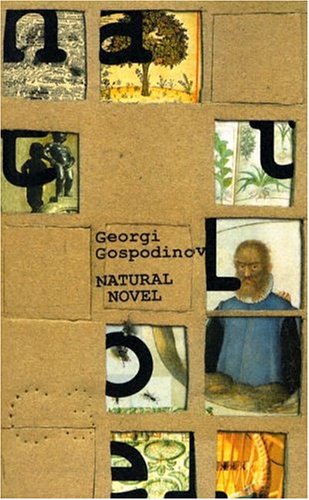I was worried that my vast ignorance of Bulgarian literature might get in the way of a critical appreciation of Georgi Gospodinov’s Natural Novel, which was first published in 1999 and now appears in the Eastern European Literature Series of the Dalkey Archive Press. But my worry was unfounded because Gospodinov’s novel, with its metafictional games, playful narrative fragmentation, and obligatory epigraph from Foucault, belongs more to the cosmopolitan postmodern aesthetic of Italo Calvino than its native locale.
In truth, the novel could have been set almost anywhere, and readers who have reached the point of exhaustion with novels in which writers write about writing, where writer characters cross paths with people who share their name and who also are writers, etc., might put this book down too quickly. That would be a shame, because Gospodinov, a thirtysomething literary editor and professor in Sofia, is not the sort of experimentalist who uses metafiction to flaunt a belief that there is nothing left to say. If anything, Gospodinov is the opposite kind of writer, constructing a baroque apparatus of false starts, digressions, devices, and dodges in order to avoid an extraordinarily painful story—that of a writer who finds out his wife is pregnant with another man’s child. The basic trauma of the situation is ineluctable, so that the more yarns the narrator spins around it, the more you sense his desperation and avoidance.
Gospodinov’s art lies in curtailing the metafictional episodes and sprinkling them across the main story so that the alternations and juxtapositions between the two are resonant rather than tedious. It’s a tightrope act, to be sure, and not the most deviant or original narrative strategy, but Gospodinov makes it work by keeping the chapters incredibly short. (Indeed, the entire book comprises only 136 pages, many of those filled with blank space, and can be read in a single sitting.) Episode after episode presents a frenetic series of ideas for various novels and books: a novel composed only of verbs; a “Novel of Beginnings” that reboots automatically every seventeen pages; a nightmare text called “The Bible of the Flies” that tells the story of Genesis from the perspective of the flies watching all flesh being prepared for their delectation.
Then, abruptly, you get emotionally crushed by the narrator’s sorrow—and by hints of his barely acknowledged guilt. For what sort of marriage was it, and what sort of husband drove his wife so far afield? Is the affliction of being unable to complete any narrative thread a recapitulation of the narrator’s inability to endure love or look things squarely in the face? Whatever the case may be, Gospodinov is downright brilliant when describing the ruin of the relationship: “When the marriage is over and the last dinner set has already been divided, there’s one more thing to divide: friends.”
This subdued emotional intensity, and Gospodinov’s gradually revealed narrative of the catastrophic event, ultimately makes the substance of the novel more interesting than its experimental structure. Gospodinov, like Paul Auster, uses the old bag of metafictional tricks in a mostly realistic and emotionally wrenching story. This heartbroken tone makes Gospodinov’s work more honest and also more contemporary than might appear at first glance. You never get the feeling that the fiction is ever quite fictional, and ultimately it is the personal devastation seeping through the cracks of Gospodinov’s Natural Novel that feels most novel and most natural.
—J. M. Tyree





